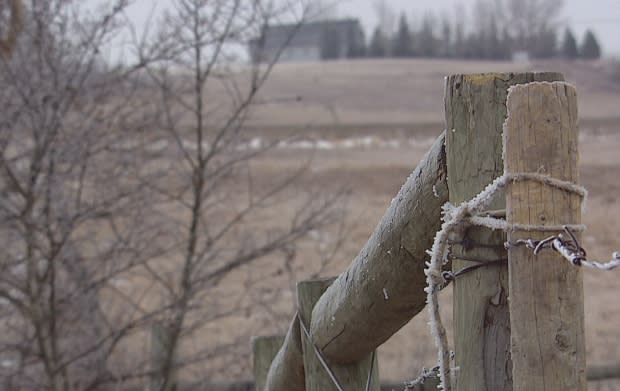Southern Alberta farmers cross fingers for more snow ahead of spring planting
Southern Alberta farmers will welcome this week's forecasted flurries after a dry winter has them worried about spring crops.
Snow adds essential moisture to soil that often can't be made up with rainfall in the spring. This past month has been unusually dry — so dry, the province has posted fire warnings at times, a move that would have been unheard of during last year's heavy snowfall.
"We would like to see the snow come and stay for a while," Alberta Wheat Commission vice chairman Gary Stanford said Wednesday. "Also, we really need wet snows in March and then of course the spring rains in April and May."
The last big snowfall in the Calgary area was back in October, and it delayed harvests. Since then, it's been a streak of fairly warm, dry weather with a few cold days sprinkled in but little precipitation of any kind.
South of the Yellowhead highway, snow packs thin out, leaving most of southern Alberta "largely snow free," says the latest provincial soil moisture update from Jan. 6. South of Calgary has seen below average snow, whereas to the north, precipitation has been "at least near normal," the report says.
Some snow coming
Now, Environment Canada is predicting flurries Wednesday, along with a fog advisory for Calgary. Thursday, expect up to two centimetres for the city with a low of -17 C.
Further south, Pincher Creek and Lethbridge are expected to see up to four centimetres Thursday, while Medicine Hat may only get flurries.

The dryness has been showing in farmers' fields, Stanford told the Calgary Eyeopener. He farms near Magrath, south of Lethbridge. He's measured up to 30 centimetres of moisture in the grass fields, but for another metre down, the soil is "bone dry."
That matches measurements done by Alberta Agriculture, which tracks how much snow pack equals water in fields. Much of the south has had little, if any, snow.

The so-called "snow drought" might still be avoided, Stanford said, if snow falls in January and February — typically colder months — and if the usual heavy, wet snow comes in March. But farmers will be watching closely and might adjust what they plant in mid-April and May.
"If it still looks very dry, but close to the 1st of May, and we still don't see any moisture in the forecast then we'll seed crops that will sustain the drought a little bit more," Stanford said.
Flax, for example, is a short crop and doesn't cover the ground very much, he said, so it needs moisture to grow. Barley, however, covers more ground, preventing evaportation from the sun and the warm winds. That helps to keep the ground from drying out.
"Most farmers understand this and to try and figure out some kind of game plan," Stanford said.
With files from the Calgary Eyeopener.

